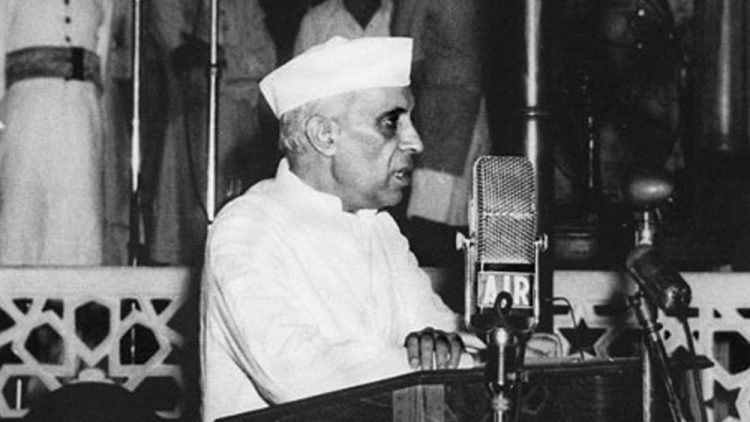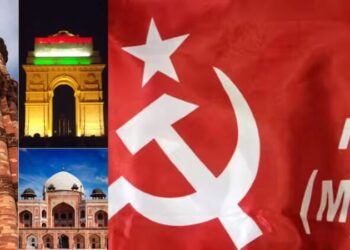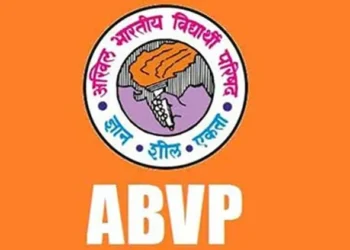Nehru lacked confidence in his ability to persuade Muslims to get out of their psychological and cultural ghetto and join the mainstream. He also had a boundless affinity towards the Muslim community and its culture. Sadly, both of these traits led to the infliction of perpetual wounds in the body of this great country.
Unfortunately, his dynasty has also followed the same legacy, ruling for decades and weakening vigour of the country.
It is common knowledge that the Kashmir problem is the creation of Jawaharlal Nehru, the first Prime Minister of India.
Brig. (Retd.) B. N. Sharma in his book titled ‘Indian Betrayed: The Role of Nehru’ says, “The root cause of alienation of the Kashmiri people and separatist trends in the politics of that unhappy state is the continued presence of Article 370 in the Constitution of India which ensures a special status for the State as against the other states of the Indian Union.”
A glance at the series of developments that led to the birth of Article 370 and the incidents that followed would expose the real truth behind the whole Kashmiri issue.
The seeds of alienation of the Kashmiri people were in-fact sown as early as July 1952. Nehru announced in the Union Parliament the Delhi Agreement leading to the incorporation of Article 370 in the Constitution of India.
Contrary to the expectations of the people, Article 370 ‘mid-wifed’ by Nehru and Sheikh Abdullah, did not really secure the integration of Kashmir with the Indian Union but encouraged the Sheikh to carve out an independent fiefdom for himself”.
Article 370 proved to be a stratagem to clothe the Centre’s incapacity to do its duty in the garb of pompous principles. Article 370, as it was emphasized, was the umbilical cord which bound Kashmir with India and through which provisions of the Indian Constitution could be extended to the territory of Kashmir.
It was the link to serve a temporary purpose until the State is totally integrated within the Indian Union. That the article is a temporary provision is evident from its very title which reads “Article 370 Temporary provision with respect to the State of Jammu and Kashmir”.
While addressing a Special delegation in Srinagar Nehru said “Article 370 of the Constitution will disappear by getting eroded gradually.” On hearing this, Ex- PM of Kashmir Bakshi Gulam Muhammed retorted, “Article 370 of the Constitution is a permanent provision and that Kashmir’s destiny is tied up with it”.
The Prime Minister said in the Parliament later, “Article 370, as the House will remember, is a part of certain transitional and provisional arrangements. It is not a permanent part of the Constitution. It is a part so long as it remains so.”
The protean face of Nehru surfaced later when he said “Some fresh steps are being taken and in the next month or two they will be completed. We should allow it to go on. We do not want to take the initiative in the matter and completely put an end to Article 370. The initiative, we feel, should come from the Kashmir State government, and people. We shall gladly agree to that”.
Thus, an important issue which should have been resolved forever was thrown into uncertainty.
This was the olive branch for the future but the Centre cannot and will not enact something vital, that sustains the unity and integrity of the country unless the local government and the people wish it.
This argument was used with deadly repetition when it suited Nehru. Be it in the case of implementation of Hindi as a national language and the opening up of the Tribal areas to Christian Missionaries (Thanks to Nehru almost all the population of North East tribal areas is Christian). The same argument was used against the introduction of uniform civil code provision under Article 44 of the Constitution.
One can easily understand the greatness of Sardar Patel from the way he had responded to Nehru’s handling of the Jammu and Kashmir issue. Patel had reluctantly acquiesced to the usurpation of Kashmir portfolio by Nehru, a subject legitimately falling under the Department of States of the Ministry of Home Affairs. He did this to avoid unpleasantness.
Sardar Vallabhbhai Patel was the Home Minister of India after independence and V. P. Menon, was the then Home Secretary. The adroitness and pragmatism of Sardar and his Secretary were well known. They worked as a team to change the shape of the country and merged 565 princely states into the Indian Union.
On hearing the news that Sardar Patel is entrusted with the task of merging the Princely States in the Indian Union, Lord Mountbatten wrote to British Prime Minister, Clement Atlee, “I am glad that Nehru has not been put in charge of the new State Department, which would have wrecked everything. Patel who is essentially a realist and very sensible is going to take it over….”
His words turned out to be prophetic. Prime Minister Jawaharlal Nehru’s taking over of the responsibility to merge Jammu and Kashmir with India and the events that followed proved that the apprehension of Lord Mountbatten was not wrong.
Sardar Vallabhbhai Patel felt concerned when without consulting him, Nehru brought in Gopalaswamy Ayyangar as a minister without portfolio to help Nehru in dealing with Kashmir and the duo started muddling it up. He mentioned the same to Nehru without mincing words.
From the records kept by V Shankar, ICS, Personal Secretary to Patel, and the correspondence of Sardar Patel, published by Durga Dass, it is clear that Nehru had finalized the draft of Article 370 in collusion with Sheikh Abdullah without even consulting Patel and then proceeded abroad leaving Ayyangar to hold the baby during his absence through debates in the Constituent Assembly.
During a talk, Patel told V. Shankar, “Gopalaswami has appealed to me for help. How could I have let him down in the absence of his chief?”
But to others, the Sardar made a prediction, “Jawaharlal Royega”.
Barely two years later on July 24, 1952, after Patel’s death, Nehru made a detailed statement on Kashmir in Parliament dealing with all issues including the slow progress of integration of the state of Kashmir. He mentioned that Sardar Valabhbhai Patel was all the time dealing with these matters. Stressing again the temporary nature of Article 370, he obfuscated the issue and involved the Sardar in the decision making, the very man who opposed it tooth and nail.
Nehru said, “This came to an end in November, I think of 1949 when we were designing our Constitution in the Constituent Assembly. Well, we could not leave everything quite vague and fluid there. Something had to be stated in our Constitution about Jammu and Kashmir State. That problem had to be faced by Sardar Patel. Now, he did not wish to say much, he wanted to leave it; we all wanted to leave it in a fluid condition because of these various factors, and gradually to develop those relations. As a result of this, a rather unusual provision was made in our Constitution relating to Jammu and Kashmir a provision is now in Article 370”.
Nehru lied and took the stand that Article 370 was dealt with by Sardar in his absence and he was not responsible for it.
V. Shankar says that he had met Gopalaswmi the same evening, as he was walking on the lawn of his residence and questioned the bona fide of Pandit Nehru’s stand.
Shankar continues that Gopalaswami’s reaction was one of anger and he said, “ it is an ill-return to Sardar for the magnanimity he had shown in accepting Panditji’s point of view against his better judgment.”
Sardar’s prophetic words turned out to be true when a year later on 8th August 1953 Nehru realized his blunder and ordered the arrest of Sheikh Abdullah.
Nehru’s appeasing mentality and lack of courage to assert on matters that are of great importance such as national integration and national security have resulted in Kashmir having its own Constitution by virtue of the Article 370 and different from other states which have a uniform Constitution as enshrined in part IV of the Indian Constitution.
Inevitably, a number of discrepancies and avoidable problems, such as the right to hold property, citizenship, and freedom of settlement for the Indian citizens, have arisen. An Indian national has no right to settle or buy property in this state. While an average citizen of India can claim only single citizenship, a person in Jammu and Kashmir can have two citizenships, of India and that of the State.
In addition, those outside Kashmir cannot vote. What is most galling is that a woman of Jammu & Kashmir origin if married to an Indian who is a non-citizen of the State loses claims to property, both of her own and that inherited from her parents. Thus goes such unreasonable, archaic and legally unsound laws, which are incompatible with the fundamental principles of our Constitution.
Uniform Civil Code
Nehru’s similar dilly-dallying attitude has led to the non-implementation of the Uniform Civil Code. The landmark judgment of Supreme Court on 10th May 1995, and its direction to the Government of India asking to work towards implementing a uniform civil code, “reminds one of the fills of omission and commission as early as 1954 when Nehru moved the Hindu Civil Code Bill”.
Article 44 of the Directive Principles in the Constitution urges the state to “secure for its citizens a Uniform Civil Code”. Parliament can amend the Fundamental Rights for implementing the Directive Principles of state policy as long as the amendment does not touch the basic features of the Constitution and nothing prevents it from enacting legislation to enforce them.
Nehru, who scoffed at Hindus for their antiquated religious customs and beliefs, had the courage to enact the Hindu Marriage Act (1955), the Hindu Succession Act (1956) and the whole gamut of Hindu Code Bill.
However, Nehru could not muster the courage to amend the Muslim Personal Law in a similar manner.
The Supreme Court judgment had spelled out that the successive governments till date have been wholly careless in their duty to implement their Constitutional mandate enshrined in the Directive Principles of the State Policy.
The Supreme Court further averred that a Uniform Civil Code was imperative both for the protection of the oppressed and the promotion of national unity and solidarity. The first step towards the Uniform Civil Code was to rationalize the Personal Law of the Minorities “to develop the religious and cultural amity”.












